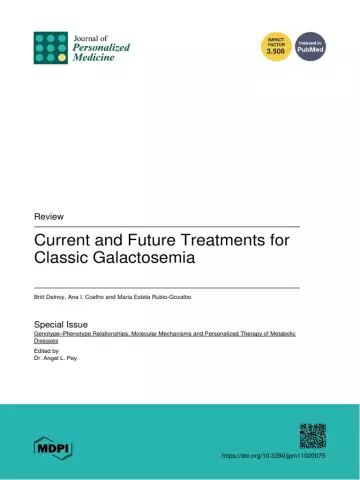- Author Rachel Wainwright wainwright@abchealthonline.com.
- Public 2023-12-15 07:39.
- Last modified 2025-11-02 20:14.
Galactosemia

Galactosemia is a rare hereditary metabolic disorder in which the metabolism of galactose carbohydrates is abnormal. Galactosemia should not be confused with lactose intolerance. These two diseases are not related in any way. Galactosemia is inherited genetically, in an autosomal recessive type, and occurs due to insufficient activity of the enzyme responsible for the full assimilation of galactose by the body.
For the first time this disease was described in 1917, and already in 1956 the main cause of the disease was revealed - a violation of the metabolism of galactose.
Galactosemia in newborns occurs in about 1 case out of 15-20 thousand. A very rare disease that can sometimes be found in Japan and much more often among Irish nomads (or Irish Gypsies), which is due to inbreeding within a relatively small gene pool.
Causes of galactosemia
To date, it is reliable that galactosemia occurs as a result of a congenital defect in certain genes. These genes are responsible for the secretion of enzymes that convert galactose, which enters the body along with food, into glucose - the main nutrient for the myocardium and brain cells.
With galactosemia, galactose derivatives accumulate in the cells of the nervous system, internal organs and the lens of the eye, exerting a toxic effect on them. With this disease, frequent severe bacterial infections caused by excess galactose and suppression of leukocyte function are possible.
Symptoms of galactosemia
There are three types of galactosemia that share similar features: classic, Dewarte's, and Negro's. The most common is classic galactosemia.
The first symptoms of galactosemia in a child appear within a couple of days after birth. They arise against the background of feeding with dairy food and manifest as vomiting and stool disorders in the form of watery diarrhea. The kid is worried about intestinal colic and bloating, jaundice and profuse gas.
In the absence of timely diagnosis of galactosemia in newborns, the liver increases in size and damage to the nervous system develops - a decrease in muscle tone, convulsions.
Gradually, the symptoms of galactosemia are manifested in a pronounced lag in mental and physical development, clouding of the lens (cataract) may be observed. The main problem is liver cirrhosis, which in the absence of adequate treatment is the main cause of death.
It should also be noted that in some forms of galactosemia, symptoms do not appear immediately. For a long time, children can only experience intolerance to dairy products, manifested by spastic abdominal pain, as well as periodic diarrhea and vomiting. Galactosemia Duarte refers generally to an asymptomatic form, which is clinically not clearly expressed, but it is a predisposing factor to various liver diseases.
The main complications of galactosemia are liver cirrhosis, bacterial sepsis, vitreous hemorrhage and lens opacity, and premature ovarian failure.
Diagnosis of galactosemia in newborns

In order to reduce the risk of complications, it is very important to diagnose galactosemia as early as possible. Today, in many maternity hospitals, an analysis for galactosemia (screening) is mandatory for all newborns. Parents should be wary if the following symptoms of galactosemia occur: after the start of breastfeeding or formula feeding, diarrhea and vomiting appear in the child, mucous membranes and skin (primarily the sclera of the eyes) turn yellow. Also, the presence of the disease may be evidenced by abundant discharge of gas and bloating, a lag in mental and physical development, and slow growth of the child. If there is even the slightest suspicion, it is necessary to urgently consult a pediatrician and get tested for galactosemia.
Laboratory methods for diagnosing galactosemia are mainly reduced to detecting an increased content of galactose in urine and blood. Helps to establish the correct diagnosis by performing the D-xylose absorption test and stress tests with galactose and glucose. Undoubted confirmation of the presence of galactosemia in a patient is genetic testing, thanks to which doctors identify a mutant gene responsible for the development of the disease.
Non-specific laboratory tests for galactosemia include a biochemical blood test and a general urine test. These methods allow you to determine how the disease progresses and the degree of damage to internal organs. For the same purposes, instrumental diagnostic methods are widely used (electroencephalography, study of the lens of the eye using a slit lamp, ultrasound of the abdominal organs, puncture biopsy of the liver).
Galactosemia treatment
The main criterion for the successful treatment of galactosemia is its early diagnosis. The treatment is very long and is carried out by therapists and pediatricians on an outpatient basis.
Treatment is based on a lactose-free diet. Today, a wide range of special nutritional formulas can be purchased without milk sugar. The diet expands as the child grows older. New foods are introduced with extreme caution. A lactose-restricted diet is followed until the child is five years old, after which partial compensation for the malfunctioning of enzymes is possible. If galactosemia in a newborn is extremely severe and causes various complications, the diet is followed for life. At the same time, almost all products containing starch, lactose and sucrose are excluded from the diet. In this case, products containing fructose become an alternative source of carbohydrates.
Medical treatment of galactosemia, as a rule, is symptomatic and aimed at improving metabolic processes in the body, as well as eliminating disturbances in the functioning of damaged organs. For this purpose, drugs are prescribed that improve metabolism. With galactosemia, it is prohibited to take any medications without first consulting a doctor.
For the prevention of galactosemia, given its hereditary nature, it is recommended that future parents undergo genetic counseling. This is especially true for parents who already have one child with galactosemia. In addition, genetic counseling is recommended for all immediate family members of childbearing age.
YouTube video related to the article:
The information is generalized and provided for informational purposes only. At the first sign of illness, see your doctor. Self-medication is hazardous to health!






